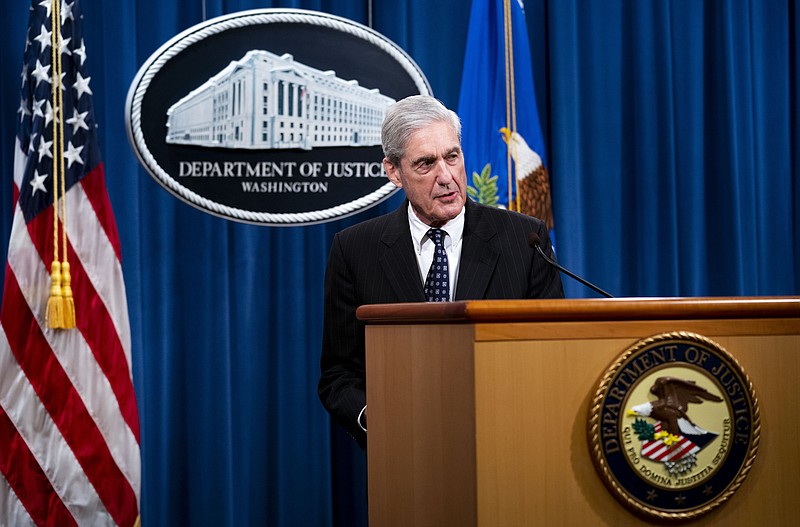The big question for the testimony of former special counsel Robert Mueller before two congressional committees today will not be the long-famous Watergate query, "What did the president know and when did he know it," from then-Tennessee Sen. Howard Baker.
The big question will be whether Mueller's testimony helps Americans understand the truth about the Russia investigation, rather than the untruthful spin put on it by President Donald Trump and his newest handmaiden, Attorney General William Barr.
The New York Times said it well - albeit saddeningly - Tuesday: "Despite all the political heat surrounding the Russia investigation, most Americans will never read the Mueller report. Many have only a vague sense of what it says - or, worse still, their perception of it is inaccurate, thanks to the efforts of Mr. Trump and his defenders to distract from and distort the findings."
That said, if all Mueller and questioners do is read portions of the report aloud for five-hours of live-screened testimony - the movie is the analogy Democrats are using for the "War and Peace"-like read of the Mueller Report vs. its televised effect - watchers may come to understand the foul truth about our sitting president's attempts to snuff out the investigation of a foreign power's interference in our 2016 presidential election, the election Russia helped Trump win.
They may come to grasp the complete lack of ethical thought in the Trump campaign as it eagerly accepted dangles of Russian "dirt." They may come to sicken from the stench of the administration as it sought - still seeks - to prevent those truths from coming to light.
Trump, who has falsely claimed the Mueller Report "exonerates" him, has accused Democrats who subpoenaed Mueller of trying to conduct a "do-over" of the special counsel's investigation into Russia's interference in the 2016 election.
Rather, Mueller's 448-page report explicitly states the probe "does not exonerate" Trump, and it lays out extensive evidence of Trump's attempts to limit the investigation - the common legal term is obstructing justice. Further, the report cites Justice Department rules that prevent charging a sitting president.
Mueller, on May 29 in his only public statement about the investigation, said "if we had confidence that the president clearly did not commit a crime, we would have said so." He further explained in the report that he and investigators were guided by principles of fairness. "It would be unfair to potentially accuse somebody of a crime when there can be no court resolution of the actual charge."
The Howard Baker question for today would be whether Mueller would have charged Trump with obstruction of justice if Trump were not the president.
Mueller already has answered - but not in one crisp and easily digestible word: Yes.
As for our president's oft' mentioned "no collusion" with the clearly established Russian effort to interfere with our election - from hacking, to misuse of social media to influence the vote for Trump, to at least 140 contacts between Russians and members of the Trump campaign, to the indictments of 25 Russian operatives and three Russian companies - that's not clear either.
Collusion isn't a legal term, but conspiracy is. Mueller's report states the investigation found "insufficient" evidence to specifically connect the president to the Russian interference. The report doesn't say there was no evidence. Nor does it say there was evidence to the contrary. It says there was "insufficient" evidence.
Republican questioners, meanwhile, are expected to try undermining Mueller's credibility by suggesting his team was politically biased against Trump, and by highlighting conclusions in the report that benefit the president, such as Mueller's determination that he could not sufficiently establish a criminal conspiracy between Trump or his campaign and Moscow.
To toss in another set of blinders, Justice Department officials in discussions and a last-minute memo Monday have communicated to Mueller that the department expects him to limit his testimony to the public findings of his highly-redacted report. DOJ officials argue that they consider any evidence he gathered throughout the course of his investigation to be "presumptively privileged" and shielded from public disclosure.
As a private citizen, Mueller is not bound by assertions of presidential privilege. But the former Marine is known as a rule-follower who is unlikely to defy the administration's directions to limit his testimony.
We could argue that Mueller presupposed as much when he said on May 29 in his public statement: "[The report] contains our findings and analysis, and the reasons for the decisions we made. We chose those words carefully, and the work speaks for itself. The report is my testimony."
But Mueller also often is characterized as a Boy Scout, who loves country as well as duty. He'll likely have little appetite for allowing GOP questioners to malign his team of investigators. Nor does he seem likely, if that American-hero characterization is correct, to sugarcoat findings that paint a picture of an ethically impaired and corrupt, albeit inept, president.
Stay tuned.
